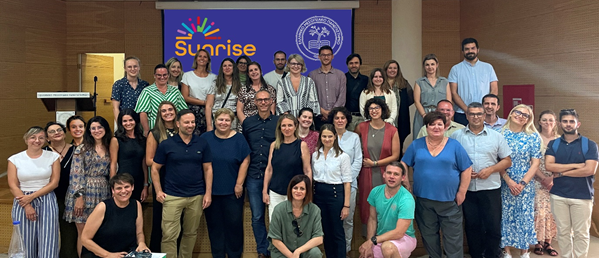The Hellenic Mediterranean University (HMU) and three laboratories, the Laboratory of Biomedical Informatics and EHealth Services – BMI (Director: Professor Mr. Tsiknakis Manolis), the Research and Development of Telecommunication Systems Laboratory – Pasiphae (Director: Assistant Professor Mr. Markakis Evangelos) and the Laboratory of Applied Social Research and Social Work – SorSoW (Director: Associate Professor Ms. Koutra Klio) announces the successful holding of the 2nd Plenary Meeting of the SUNRISE program, which took place on July 1-2, 2024, in the auditorium K45 of the School of Health Sciences, in Estavromenos, Heraklion, Crete.
The SUNRISE (SUstaiNable inteRventions and healthy behaviors for adoleScent primary prEvention of cancer with digital tools (HORIZON-MISS-2023-CANCER-01) project focuses on primary prevention of cancer through behavioral changes in adolescents – a critical period when many dangerous behaviors begin. The program combines evidence-based digital solutions to prevent smoking and other risky health behaviors with innovative approaches such as social campaigns, ad readability training, serious games, and social bot platforms.
The innovative digital interventions of SUNRISE are developed through co-creation methods, involving educators, adolescents, parents, public health experts and policy makers. The program will be implemented in 154 schools and 7500 students from 8 European countries, including socially vulnerable groups such as immigrants and ethnic minorities.
The research project is funded by the European Commission through the Horizon Europe program and coordinated by the Center for Research and Technology of Greece (CERTH). The following partners also participate: Hellenic Mediterranean University (Greece), Schweizer Institut fur Sucht und Gesundheitsforschung (Switzerland), Cyprus Association of Cancer Patients and Friends (Cyprus), Ghent University (Belgium), The Oncology Institute “Prof. Dr. Ion Chiricuta” (Romania), Alma Mater Europaea, ECM (Slovenia), Aristotle University of Thessaloniki, Laboratory of Medical Physics and Digital Innovation (Greece), BRIDG (Estonia), PredictBy (Spain), PARTICLE (Portugal), Foundation for the Promotion of Health and Biomedical Research of Valencia Region (Spain), Federazione Italiana Delle Associazioni Di Volontariato In Oncologia (Italy), Servicio Vasco de Salud Osakidetza, Paediatric Department, Pediatric Oncology Section (Spain), Biocruces Bizkaia, Clinical Research Unit (Spain), Ellinogermaniki Agogi (Greece), Vlaams Instituut Gezond Leven (Belgium), Youth Cancer Europe (Romania), The University of Sydney, The Matilda Center (Australia).
The first day of the meeting started with a warm welcome to beautiful Crete from the partners CERTH and HMU. This was followed by a brief presentation of the status of the project, and a series of presentations that highlighted the analysis of the situation in urban and rural schools in Europe, the multilateral requirements of the parties involved, and the research activities in schools as living laboratories. In the afternoon, the participants discussed strategies for the sustainable implementation of the cancer prevention program using digital tools, as well as actions for the dissemination and utilization of health technologies. The day ended with a discussion on action points.
The second day started with an overview of the development of life skills interventions based on innovative digital tools, such as robots, chatbots, and serious games. Presentations included updates on the interactive learning packages, mobile/web applications, and the digital platform being developed. The meeting concluded with the discussion of the action points of the second day and the planning of the next meeting.
The 2nd Plenary Meeting was an important step in the effort to promote sustainable health and cancer prevention through behavior change in adolescents across Europe. SUNRISE continues to pioneer the use of innovative digital tools and co-creation methods to achieve long-term changes in adolescent health behavior to reduce future cancer risks.

